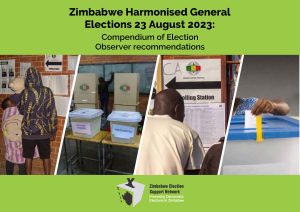The month under review saw elections remain high on the political agenda as evidence by various media reports on Zimbabwe’s readiness for elections and the subsequent instruction by President Mugabe to “budget for elections in 2011”. In addition, COPAC concluded the constitutional Reform Outreach process in most parts of the country except for Harare. Harare witnessed open……. : more
Ballot Update, Issue no 15 September 2010
Opportunity and Risk in the Proposed Polling Station-Based
One of the major features of the proposed electoral reforms is the possible introduction of a localised voting system which will be conducted using polling station-based voters’ rolls. This means a voter will only vote at the polling-station at which his or her name appears on the voters’ roll. This is significantly different from the present system whereby voters can vote at any polling station within the ward…….. : more
Electoral Law Must Prohibit State Officials’ Public Statements
Elections in Zimbabwe have always been marred by acts of violence and intimidation. As far back as 1980, when Zimbabwe held its first democratic elections, there were complaints of violence and intimidation. At the time, the euphoria brought by independence overshadowed the violence that had taken place. Although…….. : more
Voting by Illiterate or Handicapped Voters
Whilst the Constitution of Zimbabwe contains provisions to prevent discrimination on grounds of disability, the electoral laws have not always adequately covered the rights of the visually and physically handicapped. This is, of course, part of a wider societal problem and both the state and private sector should do more to enable…….. : more
Zambia elections – lessons for Zimbabwe
Zambia elections – lessons for Zimbabwe
The Zimbabwe Election Support Network sent a 15 member mission to observe Zambia‘s tripartite elections held on the 20th of September 2011. The objectives of the mission were multifaceted and included; to observe the Zambia’s electoral processes, to explore and understand civil society initiatives within and around the electoral process. Lastly, the mission sought to glean lessons and insights to inform Zimbabweans as we prepare for the referendum and the general elections in the future….. : more
Reduce Political Interference in the Accreditation of Election Observers
The credibility of an election is determined not only by the propriety with which the voting process is carried out but also by the certificate of legitimacy conferred upon it by independent election observers. Recognising the critical role of observers in elections, the regional body…….. : more
Postal voting: Govt must be pro-active
THERE are ways to vote for persons who cannot be present personally in their constituencies and wards on the designated voting days. The more traditional way is postal voting, and the other is special voting. This article analyses both and makes recommendations for their broader use to increase access to eligible voters……… : more
LIBERALISE THE BROADCAST MEDIA TO ASSIST VOTERS MAKE
It is obvious that the media plays an influential role in modern politics. In addition to the traditional electronic and print media, the internet has become a powerful tool for information dissemination, as evidenced by the reported role of social networking…. …. : more
INDEPENDENCE OF THE ZIMBABWE ELECTORAL COMMISSION
The independence of the Zimbabwe Electoral Commission (hereafter, “the Commission”) is a critical issue in the management and conduct of elections. It has the role of the umpire in the elections and for that reason must exercise its powers fairly and impartially treating each contestant equally and without fear or favour. Unfortunately, the Commission and its predecessor, the Electoral Supervisory…… …. : more
